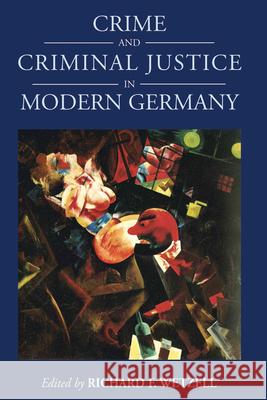Crime and Criminal Justice in Modern Germany » książka
Crime and Criminal Justice in Modern Germany
ISBN-13: 9781782382461 / Angielski / Twarda / 2014 / 368 str.
Crime and Criminal Justice in Modern Germany
ISBN-13: 9781782382461 / Angielski / Twarda / 2014 / 368 str.
(netto: 536,42 VAT: 5%)
Najniższa cena z 30 dni: 539,00
ok. 30 dni roboczych.
Darmowa dostawa!
"Overall the volume effectively moves beyond offering a one-dimensional legal history of modern Germany. Rather, the essays treat the history of crime, criminal law, and criminal justice as offering the means to reflect on broader social, cultural, and political issues facing Germany in the nineteenth and twentieth centuries." - Greg Eghigian, Penn State University "These essays make significant contributions. Thoroughly researched in primary sources, for the most part archival, they are also based on close familiarity with the most recent writings by other scholars. Together, the essays should interest a wide range of scholars whose concerns encompass modern Germany, criminal justice, or both." - Andrew Lees, Rutgers University "Gathering more than a dozen of the leading mid-career historians of crime and criminal justice in Germany from the United States, Canada, Germany, and Britain, this collection of essays represents a stunningly important contribution to one of the most vibrant fields in German history today... Deeply scholarly, sweepingly encompassing recent and older secondary work, but firmly grounded in empirical research, the essays in this volume represent an indispensable introduction to the field for scholars and students new to it, while at the same time stimulating the interpretive focus of scholars already working in the field." - Kenneth Ledford, Case Western Reserve University The history of criminal justice in modern Germany has become a vibrant field of research, as demonstrated in this volume. Following an introductory survey, the twelve chapters examine major topics in the history of crime and criminal justice from Imperial Germany, through the Weimar and Nazi eras, to the early postwar years, including case studies of criminal trials, the development of juvenile justice, and the efforts to reform the penal code, criminal procedure, and the prison system. The collection also reveals that the history of criminal justice has much to contribute to other areas of historical inquiry: it explores the changing relationship of criminal justice to psychiatry and social welfare, analyzes representations of crime and criminal justice in the media and literature, and use the lens of criminal justice to illuminate German social history, gender history, and the history of sexuality. Richard F. Wetzell is a Research Fellow and Editor at the German Historical Institute in Washington, D.C. Trained at Stanford University, he was a Postdoctoral Fellow at Harvard University and has taught at the University of Maryland, Georgetown University, and the Catholic University of America. His publications include Inventing the Criminal: A History of German Criminology, 1880-1945 (University of North Carolina Press, 2000), Criminals and Their Scientists: The History of Criminology in International Perspective (co-edited, Cambridge UP, 2006), and Engineering Society: The Role of the Human and Social Sciences in Modern Societies, 1880-1980 (co-edited, 2012). He is currently completing a legal and political history of German penal reform from 1870 to 1970.
"Overall the volume effectively moves beyond offering a one-dimensional legal history of modern Germany. Rather, the essays treat the history of crime, criminal law, and criminal justice as offering the means to reflect on broader social, cultural, and political issues facing Germany in the nineteenth and twentieth centuries." · Greg Eghigian, Penn State University"These essays make significant contributions. Thoroughly researched in primary sources, for the most part archival, they are also based on close familiarity with the most recent writings by other scholars. Together, the essays should interest a wide range of scholars whose concerns encompass modern Germany, criminal justice, or both." · Andrew Lees, Rutgers University"Gathering more than a dozen of the leading mid-career historians of crime and criminal justice in Germany from the United States, Canada, Germany, and Britain, this collection of essays represents a stunningly important contribution to one of the most vibrant fields in German history today... Deeply scholarly, sweepingly encompassing recent and older secondary work, but firmly grounded in empirical research, the essays in this volume represent an indispensable introduction to the field for scholars and students new to it, while at the same time stimulating the interpretive focus of scholars already working in the field." · Kenneth Ledford, Case Western Reserve UniversityThe history of criminal justice in modern Germany has become a vibrant field of research, as demonstrated in this volume. Following an introductory survey, the twelve chapters examine major topics in the history of crime and criminal justice from Imperial Germany, through the Weimar and Nazi eras, to the early postwar years, including case studies of criminal trials, the development of juvenile justice, and the efforts to reform the penal code, criminal procedure, and the prison system. The collection also reveals that the history of criminal justice has much to contribute to other areas of historical inquiry: it explores the changing relationship of criminal justice to psychiatry and social welfare, analyzes representations of crime and criminal justice in the media and literature, and use the lens of criminal justice to illuminate German social history, gender history, and the history of sexuality.Richard F. Wetzell is a Research Fellow and Editor at the German Historical Institute in Washington, D.C. Trained at Stanford University, he was a Postdoctoral Fellow at Harvard University and has taught at the University of Maryland, Georgetown University, and the Catholic University of America. His publications include Inventing the Criminal: A History of German Criminology, 1880-1945 (University of North Carolina Press, 2000), Criminals and Their Scientists: The History of Criminology in International Perspective (co-edited, Cambridge UP, 2006), and Engineering Society: The Role of the Human and Social Sciences in Modern Societies, 1880-1980 (co-edited, 2012). He is currently completing a legal and political history of German penal reform from 1870 to 1970.











